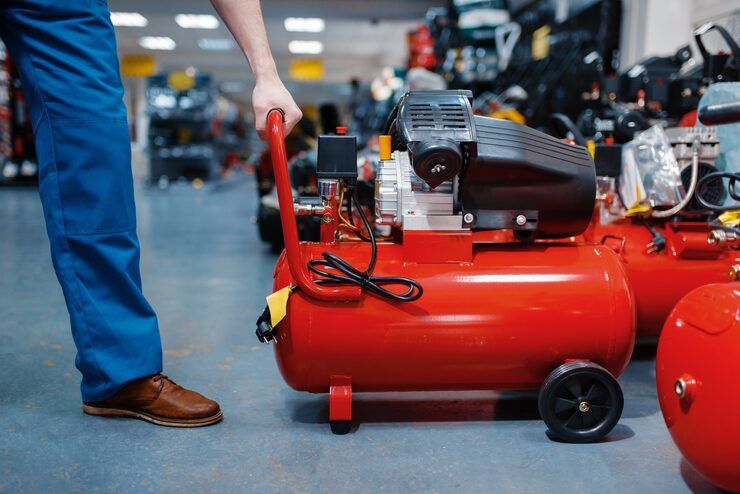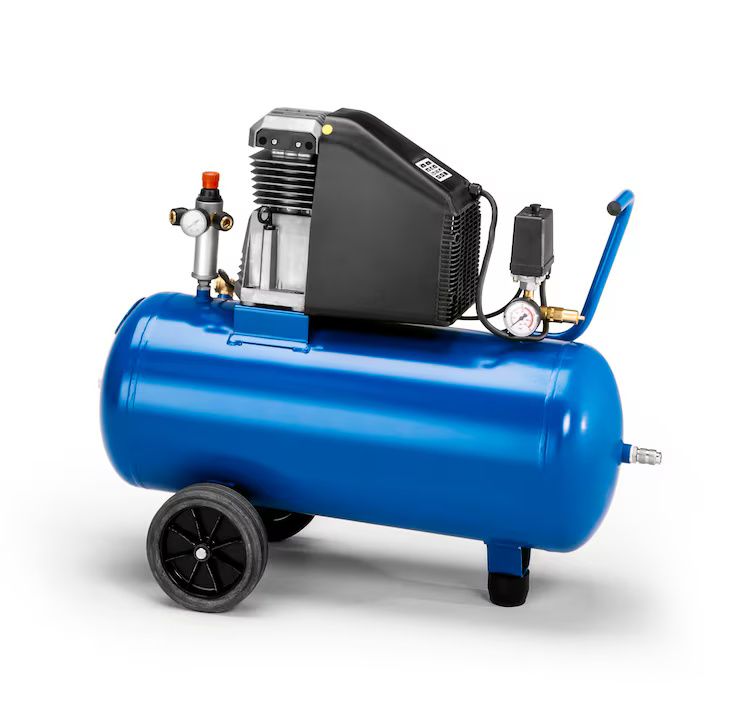An air compressor is a mechanical device that converts power—using an electric motor, diesel engine, or gasoline engine—into potential energy stored in compressed air. This compressed air can be released in a controlled way to power tools, inflate tires, or operate machinery.
The technology exists because many industrial, commercial, and even household tasks require a consistent and reliable source of pressurized air. From large manufacturing plants to small workshops, air compressors help improve efficiency and reduce manual labor.

Air compressors play a crucial role in various sectors:
-
Manufacturing – Powering pneumatic tools, spray painting, and automation systems.
-
Construction – Operating jackhammers, drills, and concrete compactors.
-
Automotive – Inflating tires, spray painting, and cleaning components.
-
Medical and Food Industry – Supplying clean, dry air for sensitive applications.
Why it matters today:
-
The growing trend toward automation has increased the demand for reliable compressed air systems.
-
Industries are focusing on energy-efficient compressors to reduce operational costs.
-
Small businesses and DIY enthusiasts use portable compressors for everyday tasks.
Problems it solves:
-
Reduces manual labor and speeds up production.
-
Offers consistent power supply where electricity or fuel-powered tools are impractical.
-
Supports clean and safe air delivery in specialized industries.
Recent Updates
The air compressor market has evolved with technological advancements:
| Year | Trend | Impact |
|---|---|---|
| 2023 | Shift to oil-free compressors | Meets environmental and food safety regulations |
| 2024 | Smart IoT-enabled compressors | Enables predictive maintenance and energy optimization |
| 2024 | Higher adoption of variable speed drive (VSD) technology | Reduces energy consumption by 20–30% |
Other notable updates:
-
Portable lithium-ion battery-powered compressors are becoming popular in construction and outdoor applications.
-
Manufacturers are introducing noise-reduction technology for urban work environments.
-
Increased focus on carbon-neutral manufacturing processes for compressor production.
Laws or Policies
Air compressors are subject to various safety and environmental regulations depending on the country:
-
OSHA (Occupational Safety and Health Administration, USA) – Sets standards for workplace compressor operation, including pressure vessel safety and noise limits.
-
EU Machinery Directive – Ensures that compressors meet health and safety requirements before being placed on the market.
-
Environmental Regulations – Many regions have emission and energy efficiency guidelines, especially for large industrial units.
-
ISO Standards – ISO 8573 defines air quality classes for applications like food, pharmaceuticals, and electronics.
Businesses using compressors must ensure:
-
Regular inspection and maintenance.
-
Pressure relief valves are functional.
-
Operators are trained for safe use.
Tools and Resources
Useful Tools and Software
-
Kaeser Sigma Air Manager – Centralized compressor control and monitoring.
-
Atlas Copco Air Compressor Calculators – Helps determine correct capacity and efficiency.
-
Quincy Compressor Maintenance App – Tracks servicing schedules and troubleshooting.
-
Online Air Flow Calculators – For determining optimal pipe sizing and air delivery rates.
Learning Resources
-
Compressed Air & Gas Institute (CAGI) – Industry guidelines and best practices.
-
YouTube Technical Channels – Step-by-step compressor repair and maintenance guides.
-
OSHA Safety Training – Courses on air compressor handling and compliance.
FAQs
Q1: What are the main types of air compressors?
A: The main types are reciprocating (piston), rotary screw, and centrifugal compressors. Each is suited for different power needs and applications.
Q2: How often should an air compressor be serviced?
A: For industrial use, basic maintenance should be done monthly, with a full inspection every 2,000–4,000 operating hours.
Q3: What size air compressor do I need?
A: It depends on your air tool’s CFM (cubic feet per minute) requirement and pressure needs. A small shop might need a 5–10 CFM unit, while large factories require 100+ CFM.
Q4: Are oil-free compressors better?
A: Oil-free compressors are preferred in industries requiring clean air, like food and pharmaceuticals, but they may have a shorter lifespan compared to oil-lubricated ones.
Q5: How can I reduce energy costs with an air compressor?
A: Use variable speed drives (VSD), fix air leaks, and ensure regular maintenance to maintain efficiency.
Final Thoughts
Air compressors are an essential part of modern industry, offering a reliable power source for countless applications. With advancements in efficiency, noise reduction, and smart technology, they are becoming more cost-effective and environmentally friendly. Whether in manufacturing, healthcare, or DIY projects, selecting the right compressor and maintaining it well ensures long-term productivity and safety.
